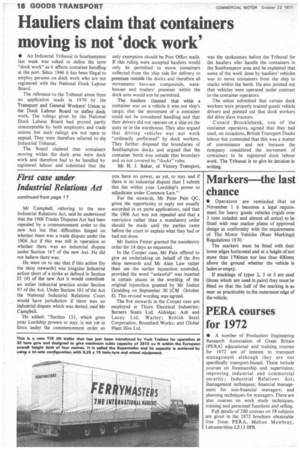Hauliers claim that containers moving is not 'dock work'
Page 20

If you've noticed an error in this article please click here to report it so we can fix it.
• An Industrial Tribunal in Southampton last week was asked to define the term "dock work" as it affects container handling at the port. Since 1946 it has been illegal to employ persons on dock work who are not registered with the National Dock Labour Board.
The reference to the Tribunal arose from an application made in 1970 by the Transport and General Workers' Union to the Dock Labour Board to define dock work. The rulings given by the National Dock Labour Board had proved partly unacceptable by both employers and trade unions but such rulings are not open to appeal. They were therefore referred to the Industrial Tribunal.
The Board claimed that containers moving within the dock area were dock work and therefore had to be handled by registered labour and submitted that the
only exemption should be Post Office mails. If this ruling were accepted hauliers would only be permitted to move containers collected from the ship side for delivery to premises outside the docks and therefore all movements between compounds, warehouses and traders' premises within the dock area would not be permitted.
The hauliers claimed that while a container was on a vehicle it was not ship's cargo, that the movement of a container could not be considered handling and that their drivers did not operate on a ship on the quay or in the warehouse. They also argued that driving vehicles was not work "ordinarily performed" by dock workers. They further disputed the boundaries of Southampton docks and argued that the container berth was outside that boundary and so not covered by "docks" rules.
Mr H. J. Baker, of Victory Transport, was the spokesman before the Tribunal for the hauliers who handle the containers in the Southampton area and he explained that some of the work done by hauliers' vehicles was to move containers from the ship to stacks within the berth. He also pointed out that vehicles were operated under contract to the container operators.
The union submitted that certain dock workers were properly trained goods vehicle drivers and pointed out that dock workers did drive slave tractors.
Cunard Brocklebank, one of the container operators, agreed that they had used, on occasions, British Transport Docks labour but contended that this was a matter of convenience and not because the company considered the movement of containers to be registered dock labour work. The Tribunal is to give its decision in writing.








































































































